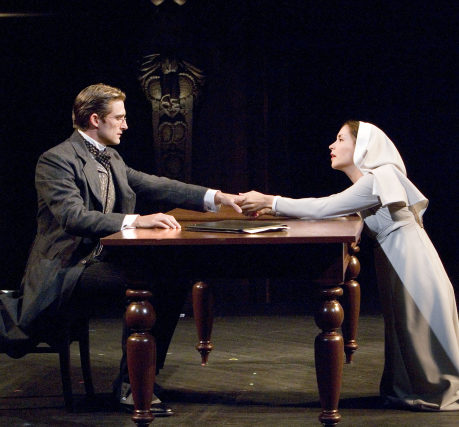Shakespeare’s play with perhaps the most modern relevance is probably not one you read in high school.
While Romeo and Juliet and Hamlet stand out as the most widely taught Shakespeare plays, there isn’t a play in his canon that shakes me more than Measure for Measure.
Measure for Measure is generally regarded as a “problem play”—a term coined to describe Shakespeare’s plays that are difficult to fit into just one genre, balancing comedy and tragedy in a way that most of his other works do not. But Measure for Measure is not just a “problem” in terms of tone; the play’s subject matter is incredibly layered and complex.
Measure for Measure is a play about sex, consent, and hypocrisy. But more than anything else, Measure for Measure is about the abuse of power.
The play revolves around upheaval in Vienna following the installment of a temporary new duke—a rigid and puritanical man named Angelo. Immediately after he’s been put into power, Angelo begins strictly enforcing rules against “unlawful sexual activity.” First on the chopping block is a man named Claudio, who is arrested for impregnating his lover out of wedlock. Though the sex was consensual and they are engaged to be married anyway, Angelo wants to make an example of Claudio and sentences him to death. In hopes of saving Claudio’s life, his sister Isabella (who is in training to be a nun) goes to Angelo to plead her brother’s case. Angelo is immediately taken with Isabella, and begins lusting over her obsessively.
Drunk on his newfound power, Angelo presents Isabella with a proposition: he will spare her brother’s life, but only if she has sex with him.
Isabella is, of course, revolted at this ultimatum, and threatens to tell the world exactly what kind of man Angelo is. To this, Angelo responds with the most chilling line in the play: “Who will believe thee, Isabel?”
It’s a terrifying question that kicks off the second half of the play. What can Isabella do, knowing that her word cannot stand against Angelo’s in the court of public opinion? How can she save her brother’s life without sacrificing her own agency?
The play screams these questions in a modern voice—especially following the Weinstein case and more recently, the conviction and death of Jeffrey Epstein. Though it was penned over 400 years ago, Measure for Measure reads like it was ripped from the headlines, a startling play for the Me Too era.
However, though Measure for Measure is often surprisingly contemporary, it still falls victim to the notions of its time. This becomes glaringly obvious in Act IV, with the introduction of the “bed trick.”
In typical Shakespearean plot twist fashion, it is revealed that Angelo actually has a fiancé; a woman named Mariana, whom he abandoned after she lost her fortune in a shipwreck. Isabella is advised to ‘agree’ to Angelo’s proposal- on the condition that they must meet in a dark room and never speak—but to send Angelo’s betrothed instead of going herself. This is known as the “bed trick,” an infamous and unfortunately popular trope in older literature where a character has sex with someone they mistake for someone else.
This is, of course, a violation of consent and an act of sexual violence in and of itself. Consenting to have sex with one person does not equal consenting to have sex with another. Though it is the villain of the play who falls prey to this “trick,” that doesn’t matter—no one “deserves” to have their consent violated.
Measure for Measure is far from a perfect play, but I appreciate it for the questions it is willing to ask its audience. Sadly, in spite of its modern relevance, it’s a Shakespeare play that is rarely produced and even more rarely taught, especially in high schools. I think students would benefit from learning about the play, not just because it’s a well crafted piece of theatre, but because it opens the door for discussions about consent that are sorely needed in our education system. Though I love Hamlet and definitely see why it’s so widely taught, I tend to think that students are more likely to deal with issues revolving around consent and harassment than killing their uncles.
Measure for Measure is unsettling but well worth the read, and as it (unfortunately) remains relevant, I hope to see it brought to life more onstage.




